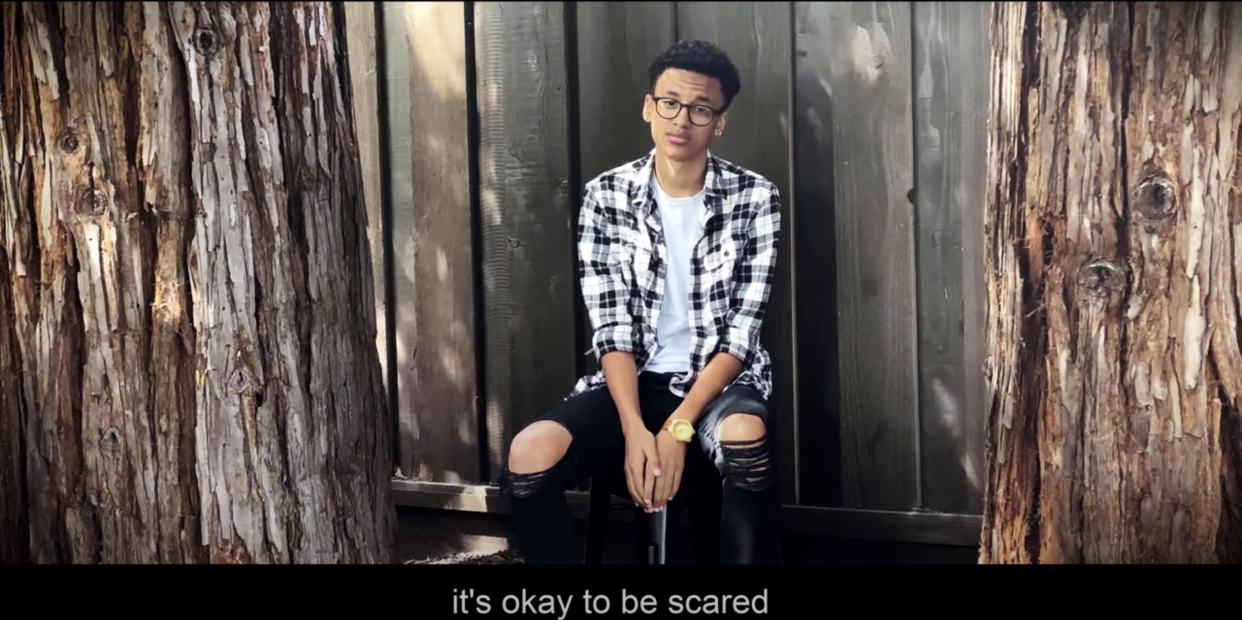'The world is scared right now': 16-year-old boys create short film to speak out about racial injustice, coronavirus

A powerful short film called “A Cure for Humanity” urges people to come together and be open-minded during difficult times characterized by racial tensions and the coronavirus pandemic. The 16-year-olds behind the spoken word performance and visual production tell Yahoo Life that it was the fear they’ve been feeling in recent months that motivated them to create it.
“The world is scared right now,” Iziyah Robinson, the teen who stars in the video, tells Yahoo Life. “I look on the TV and listen to the news and I lose hope. This video gives people hope for a better tomorrow. It influences those that watch it to be the change that they seek.”
Robinson and his friend Jared Fontecha, both students at Monte Vista High School in Danville, Calif., had the idea to create a spoken word piece about the pandemic, the recent killings of black men and the ongoing bush fires in Australia when they felt they didn’t have any other way to speak out about the events weighing heavy on their heart. They also couldn’t figure out how to share their thoughts in a purposeful way.
“I haven't had the confidence to address these topics before because of how controversial they were, which is why I felt like it was time to put these real issues out there through a motivational video,” Fontecha explains. Robinson shares, “I knew that the time was now to share my message with the entire world.”
Together, the two boys worked on writing the words recited in the video and talked through a person’s life journey, from being a baby to becoming an adult fueled by prejudice and divisive beliefs. They also explain how this has similarly impacted the response to all three traumatic events, although the shootings, fires and pandemic are seemingly so different.
Robinson explains that all three events have “stripped away from everyone's certainty of life.” However, for him, it’s racial injustice that’s been most impactful. “Being a young African-American male brings its own set of struggles in life. Seeing kids like me being shot for only the color of their skin makes me realize how racism hasn't changed.”
Fontecha also wanted their project to actually inspire change going forward. “I'm not black, I am a person of color, but I still had very strong emotions regarding these shootings of unarmed black civilians for no reason. It's gotten to a point where it didn't feel right for me to keep watching it happen. I wanted to do something about it,” he says.
The beginning of their video highlights news clips in reference to a number of these tragic deaths, including that of Ahmaud Arbery, Michael Brown and Trayvon Martin. These are followed by clips detailing the soaring number of deaths related to the coronavirus and the panic caused by hundreds of fires in Australia. Robinson then immediately addresses the fact that humanity is scared, but that each and every one of us is a part of the cure.
“There are millions of amazing people on earth,” Robinson says. “They may not know it yet, but they are the only ones that can help the world survive. Help it change for the better.”
Since posting the video on YouTube on May 20, the short film has gotten an overwhelmingly positive response. Fontecha shares that the duo has also sent it to their school district to ensure that teens and kids of the younger generations see it so that the message is most impactful. “I feel like this world has the potential to be better than what we are today,” he says.
Despite everything plaguing the world today, both believe that the ultimate “cure” is people. “People bring me hope,” Robinson says.
For the latest coronavirus news and updates, follow along at https://news.yahoo.com/coronavirus. According to experts, people over 60 and those who are immunocompromised continue to be the most at risk. If you have questions, please reference the CDC’s and WHO’s resource guides.
How to maintain your physical and mental health during the pandemic
Taking care of a loved one with COVID-19? Here’s how to stay healthy
Q&A with Dr. Kavita Patel: How to keep your family safe and maintain your mental health
Read more from Yahoo Life:
Want daily lifestyle and wellness news delivered to your inbox? Sign up here for Yahoo Life’s newsletter.




